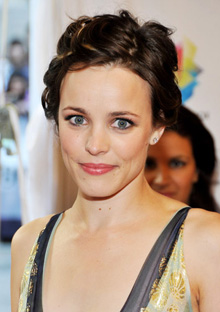
Photo: Jason Gemnich/WireImage.com
The actress falls into stories of dream and waking worlds, discovers the truth about love and learns (the hard way) that she can't read the hilarious David Sedaris in public.
My mom always took us to the library when we were kids, maybe to get rid of us for a little while, but I loved it. I travel a lot now, and I have a couple of library cards depending on which city I'm in. I love getting lost in the stacks; I like to meander and let things take my attention. That's the way my mind works. I'm one of those readers who have six books going at a time, which is why I prefer nonfiction. It's so much easier to jump in and out of. I would never say I've given up on a book—the bookmark is still there—oh, wait, I don't know if I should say this to the nation, but I did give up on Moby-Dick. And I felt really bad about it.
One of the ways I know I've got a great book is when I begin to cry. I just started one like that—on page two I was a weeping mess. I love books where you can't get out of bed. You want to consume them in one sitting, devour them. Those are my favorites, where you've almost abandoned your life for them. That doesn't happen every time, but those are the best.
— As told to M Healey
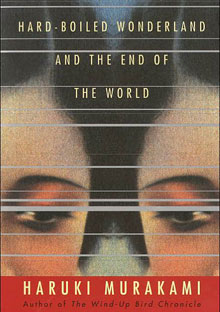
Hard-boiled Wonderland and the End of the World
By Haruki Murakami
I bought this novel in Berlin and lost it on a train in Italy. I was devastated. I'd gotten halfway through it, and I searched all over for an English translation but had to wait until I got home to finish it. I was frustrated by the first few chapters—the way they flip back and forth between the protagonist's dream life and his waking life—but once I realized that it was sort of a sci-fi mystery, I enjoyed the nonlinear writing. The dream world initially seems beautiful; then it becomes purgatory because nothing good or bad happens. You get the sense that the character would prefer reality, that he'd rather bleed when he gets cut and experience life no matter how traumatic it can be. The book raises such an interesting question: If you had the same choice, where would you want to spend your time?
By Haruki Murakami
I bought this novel in Berlin and lost it on a train in Italy. I was devastated. I'd gotten halfway through it, and I searched all over for an English translation but had to wait until I got home to finish it. I was frustrated by the first few chapters—the way they flip back and forth between the protagonist's dream life and his waking life—but once I realized that it was sort of a sci-fi mystery, I enjoyed the nonlinear writing. The dream world initially seems beautiful; then it becomes purgatory because nothing good or bad happens. You get the sense that the character would prefer reality, that he'd rather bleed when he gets cut and experience life no matter how traumatic it can be. The book raises such an interesting question: If you had the same choice, where would you want to spend your time?
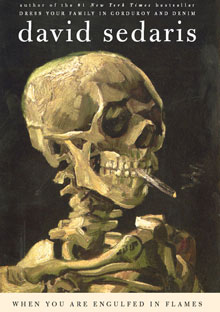
When You Are Engulfed in Flames
By David Sedaris
It's not often that a writer makes me laugh out loud, but Sedaris does. He brings me to tears. It's to the point where I can't read his writing in public because people think I'm having some kind of meltdown. In this collection of essays, he has a way of finding humor in the strangest and most painful moments, like a week with a creepy babysitter or the death of his mother. He lands in ridiculous situations—befriending a town outcast, for one—and his writing acknowledges the difficulty of getting through the day. I take myself too seriously sometimes, and Sedaris's books are such a revelation about how you can celebrate life's strangeness and idiosyncrasies.
By David Sedaris
It's not often that a writer makes me laugh out loud, but Sedaris does. He brings me to tears. It's to the point where I can't read his writing in public because people think I'm having some kind of meltdown. In this collection of essays, he has a way of finding humor in the strangest and most painful moments, like a week with a creepy babysitter or the death of his mother. He lands in ridiculous situations—befriending a town outcast, for one—and his writing acknowledges the difficulty of getting through the day. I take myself too seriously sometimes, and Sedaris's books are such a revelation about how you can celebrate life's strangeness and idiosyncrasies.
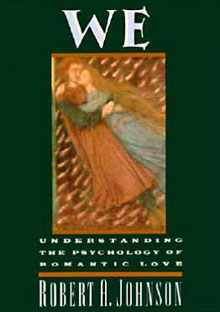
We
By Robert A. Johnson
People grow up with so many movies and fairy tales telling us that we have one ideal soul mate. Johnson uses the Tristan and Isolde myth to explain why this idea persevered and how we put expectations on our partners to live up to this legend. That's not to say romantic love doesn't exist—my parents are mad about each other—but Johnson argues that people shouldn't feel like complete, inept failures if they don't reach this emotional pinnacle. As he points out, it is based on a myth. I felt empowered after reading this book. I had more respect for "true love" and more self-assurance about finding it.
By Robert A. Johnson
People grow up with so many movies and fairy tales telling us that we have one ideal soul mate. Johnson uses the Tristan and Isolde myth to explain why this idea persevered and how we put expectations on our partners to live up to this legend. That's not to say romantic love doesn't exist—my parents are mad about each other—but Johnson argues that people shouldn't feel like complete, inept failures if they don't reach this emotional pinnacle. As he points out, it is based on a myth. I felt empowered after reading this book. I had more respect for "true love" and more self-assurance about finding it.
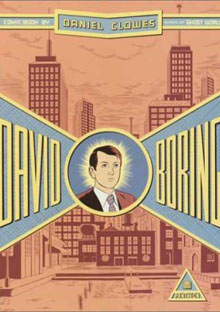
David Boring
By Daniel Clowes
David Boring opened me up to the world of graphic novels. Clowes creates quirky characters who are ordinary and flawed. They get themselves into the most extraordinary and bizarre predicaments. The main character is seeking the perfect woman, and there are many mishaps along the way. I still can't believe how deeply you can fall into these novels, which I had, sadly, dismissed as picture books. The emotion conveyed in the illustrations is so intense—the experience is a whole new way of reading.
By Daniel Clowes
David Boring opened me up to the world of graphic novels. Clowes creates quirky characters who are ordinary and flawed. They get themselves into the most extraordinary and bizarre predicaments. The main character is seeking the perfect woman, and there are many mishaps along the way. I still can't believe how deeply you can fall into these novels, which I had, sadly, dismissed as picture books. The emotion conveyed in the illustrations is so intense—the experience is a whole new way of reading.
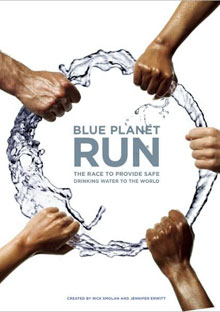
Blue Planet Run
By Rick Smolan and Jennifer Erwitt
This giant book with amazing photos is part of a project founded by Jin Zidell, a philanthropist and environmentalist who wants as many people as possible to have clean drinking water. To raise awareness for the cause, he organized the Blue Planet Run (a 95-day relay race around the world) and asked 40 photojournalists to chronicle the global water crisis. The images—one of a person walking miles to get clean water—are heart-wrenching, but they're also inspiring. As one of the essayists writes, we don't know how to cure cancer yet, but we do know how to purify water. We have the technology, and it can be implemented in cheap ways. In one village, for instance, kids play on a merry-go-round that generates the energy to pump water out of the ground. I also love that the book is carbon neutral, and 100 percent of its profits go to the Blue Planet Run Foundation.
More Books That Made a Difference
By Rick Smolan and Jennifer Erwitt
This giant book with amazing photos is part of a project founded by Jin Zidell, a philanthropist and environmentalist who wants as many people as possible to have clean drinking water. To raise awareness for the cause, he organized the Blue Planet Run (a 95-day relay race around the world) and asked 40 photojournalists to chronicle the global water crisis. The images—one of a person walking miles to get clean water—are heart-wrenching, but they're also inspiring. As one of the essayists writes, we don't know how to cure cancer yet, but we do know how to purify water. We have the technology, and it can be implemented in cheap ways. In one village, for instance, kids play on a merry-go-round that generates the energy to pump water out of the ground. I also love that the book is carbon neutral, and 100 percent of its profits go to the Blue Planet Run Foundation.
More Books That Made a Difference




